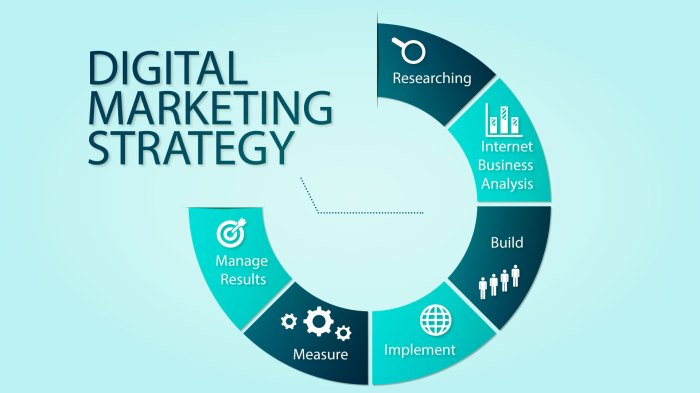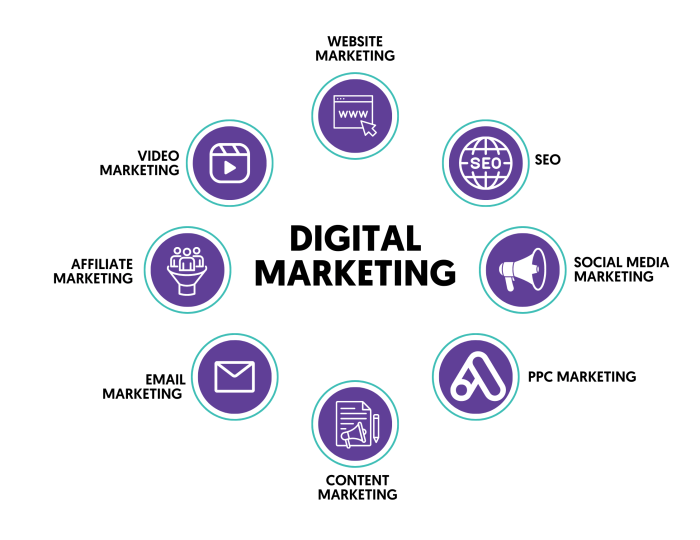Digital Marketing Strategy sets the stage for this enthralling narrative, offering readers a glimpse into a story that is rich in detail with American high school hip style and brimming with originality from the outset.
Digital marketing has revolutionized the way businesses reach and engage with their target audience, utilizing various online channels and tools to create impactful campaigns and drive results. In this dynamic landscape, having a well-crafted digital marketing strategy is crucial for success. Let’s dive into the key components, development process, tools, technologies, trends, and more that shape a successful digital marketing strategy.
Introduction to Digital Marketing Strategy
A digital marketing strategy is a plan that Artikels how a company will use digital channels to achieve its marketing objectives. This includes tactics for online advertising, social media, email marketing, content creation, and more.
Having a digital marketing strategy is crucial for businesses in the digital age. It helps companies reach their target audience, increase brand awareness, drive website traffic, generate leads, and ultimately boost sales and revenue.
Examples of Successful Companies with Effective Digital Marketing Strategies
- Amazon: Amazon uses personalized recommendations, targeted advertising, and social media engagement to drive sales and retain customers.
- Samsung: Samsung leverages influencer partnerships, engaging content, and interactive experiences to connect with consumers and showcase its products.
- Dollar Shave Club: Dollar Shave Club uses humorous and relatable content, social media campaigns, and email marketing to attract and retain subscribers.
Components of a Digital Marketing Strategy
In today’s digital landscape, a successful marketing strategy involves a combination of various components to reach and engage with target audiences effectively.
(Search Engine Optimization)
is crucial for increasing visibility and ranking on search engine results pages. By optimizing website content, s, and meta tags, businesses can improve their online presence and attract organic traffic.
Social Media Marketing
Social media platforms provide businesses with the opportunity to connect with customers, build relationships, and promote products or services. Through targeted ads and engaging content, companies can reach a wider audience and drive traffic to their websites.
Content Marketing
Content marketing involves creating and sharing valuable, relevant content to attract and retain a specific audience. By producing high-quality blog posts, videos, infographics, and more, businesses can establish themselves as industry leaders and generate leads.
Email Marketing
Email marketing remains a powerful tool for nurturing leads and converting prospects into customers. By sending personalized emails with exclusive offers, updates, and relevant information, businesses can drive conversions and build customer loyalty.
Examples of Synergistic Components
- Combining and content marketing can result in higher search engine rankings and increased organic traffic. By creating optimized content that resonates with target audiences, businesses can improve visibility and attract more visitors to their websites.
- Social media marketing and email marketing can work together to create a seamless customer journey. By promoting email sign-ups on social platforms and sending targeted emails to engaged followers, businesses can nurture leads and drive conversions.
Developing a Digital Marketing Strategy
Developing a digital marketing strategy involves several key steps that are essential for success in the online world. From market research to setting objectives, each step plays a crucial role in shaping the overall strategy.
Importance of Market Research
Market research is the foundation of a successful digital marketing strategy. It helps businesses understand their target audience, competitors, and industry trends. By conducting thorough market research, businesses can identify opportunities and challenges, which can inform their marketing approach.
- Identify target audience demographics, behaviors, and preferences.
- Analyze competitor strategies and market positioning.
- Evaluate industry trends and consumer insights.
Market research provides valuable insights that guide decision-making and help businesses create relevant and effective marketing campaigns.
Setting Clear Objectives
Setting clear objectives is crucial for a digital marketing strategy to be effective. Objectives provide a roadmap for the marketing efforts and help measure success. Whether it’s increasing brand awareness, driving website traffic, or generating leads, clear objectives ensure that efforts are focused and measurable.
- Define specific, measurable, achievable, relevant, and time-bound (SMART) objectives.
- Align objectives with overall business goals and KPIs.
- Regularly track and analyze performance against objectives to make data-driven decisions.
Clear objectives help businesses stay on track, prioritize tasks, and optimize resources for maximum impact.
Aligning with Target Audience and Business Goals
Aligning the digital marketing strategy with the target audience and business goals is essential for achieving desired outcomes. By understanding the needs and preferences of the target audience and aligning them with business objectives, businesses can create compelling and relevant content that resonates with their audience.
- Segment the target audience based on demographics, psychographics, and behaviors.
- Create personalized and targeted messaging that addresses audience pain points and interests.
- Map out customer journeys to deliver the right message at the right time through the right channels.
By aligning the digital marketing strategy with the target audience and business goals, businesses can drive engagement, conversions, and loyalty among their audience.
Tools and Technologies for Digital Marketing Strategy

In the fast-paced world of digital marketing, utilizing the right tools and technologies can make all the difference in the success of your strategy. From analytics to automation, these tools play a crucial role in optimizing campaigns and tracking performance.
Popular Tools and Technologies
- Social Media Management Platforms: Tools like Hootsuite and Buffer help schedule posts, engage with followers, and analyze social media performance.
- Email Marketing Software: Platforms such as Mailchimp and Constant Contact enable businesses to create and send targeted email campaigns, track open rates, and measure engagement.
- Tools: Tools like SEMrush and Moz assist in research, on-page optimization, and tracking website rankings on search engines.
- Content Management Systems (CMS): Platforms like WordPress and Drupal make it easy to create and manage website content, optimize for , and track user engagement.
Analytics Tools for Tracking and Measuring Success
Analytics tools are essential for monitoring the performance of digital marketing campaigns and making data-driven decisions. Some popular analytics tools include Google Analytics, Adobe Analytics, and Kissmetrics. These tools provide valuable insights into website traffic, user behavior, conversion rates, and more, allowing marketers to assess the effectiveness of their strategies and make adjustments as needed.
Role of Automation Tools
Automation tools streamline repetitive tasks, save time, and improve efficiency in digital marketing campaigns. Platforms like HubSpot, Marketo, and ActiveCampaign help automate email marketing, lead nurturing, social media scheduling, and more. By automating processes, marketers can focus on strategic planning, creative content creation, and analyzing campaign performance to drive better results.
Trends in Digital Marketing Strategy

In the ever-evolving world of digital marketing, staying on top of the latest trends is crucial for businesses looking to stay ahead of the competition. From the rise of artificial intelligence to the growing importance of influencer marketing and voice search, there are several key trends shaping the future of digital marketing strategy.
Artificial Intelligence in Marketing, Digital Marketing Strategy
Artificial intelligence is revolutionizing the way businesses approach marketing. AI-powered tools and technologies can analyze data, personalize content, and automate tasks, allowing companies to create more targeted and effective campaigns. By harnessing the power of AI, businesses can enhance customer experiences, improve ROI, and gain valuable insights into consumer behavior.
Influencer Marketing Strategies
Influencer marketing has become a dominant force in the digital landscape, with businesses leveraging the influence of social media personalities to reach their target audiences. Collaborating with influencers can help brands increase brand awareness, build credibility, and drive engagement. As influencers continue to hold sway over consumer purchasing decisions, businesses need to incorporate influencer marketing into their overall strategy to stay relevant.
Voice Search Optimization
With the increasing popularity of voice-activated devices like smart speakers and virtual assistants, voice search optimization is becoming a critical component of digital marketing strategy. Businesses need to optimize their content for voice search queries, focusing on conversational s and providing concise, relevant answers. By adapting to the rise of voice search, companies can improve their visibility in search results and connect with consumers in new ways.